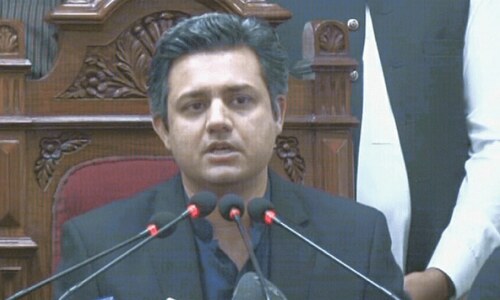ISLAMABAD: A large group of lower and upper secondary school boys from Dawn Model Secondary School in Milat Colony, Rawalpindi attended a session called ‘Brokering peace, tolerance and citizenship in our classrooms’ held at the Federal College of Education in Islamabad on the last day of the Children’s Literature Festival on Saturday.
The boys asked questions and were active, but not quite as easygoing as a group of girls who came in when the session had already started. Maybe the boys were coming of age and a bit shy, and that isn’t so bad either.
“We should all be confident about who we are, but also give space to others who may have different opinions,” a teacher said after the session. “Perhaps the most important thing we can do as teachers is to help our students become self-confident and feel good about themselves. Then they can also have the generosity of showing inclusiveness, tolerance and positive feelings to others,” he said.
The chair of the session, Rumana Husain from Karachi, underlined that her city is like a mini-Pakistan with people from all over the country, and abroad, with a lot of diversity.
“We appreciate our own culture and traditions and, at the same time, we also learn to appreciate what our neighbours and friends have.”
She also referred to her own book, entitled Karachiwala – a subcontinent with a city, which was published in 2010.
When a student said that in China people don’t have a religion, Rumana Husain was quick to say that there are many religious people in China as well, namely Confucians, Buddhists, Muslims, Christians and others. But she added that the political regime has not encouraged religion. She said she has visited China twelve times and mentioned many positive aspects about China and its hardworking people. “They don’t only copy; they also invent and create new things,” she said.
“Peace is only possible through knowledge and friendship, dosti. Conflicts often begin from misunderstandings and misconceptions. Dosti is one of the most important words in Urdu language,” Rumana said.
She emphasized the importance of one-on-one interaction in order to learn about each other, be tolerant and show respect even if one disagrees.
“If there is fight and quarrel in the classroom, there is no peace, and then we may lose the most essential relationship between people, notably friendship. Perhaps children are better at restoring to friendship than adults?” she said.
The four panelists were interacting with the students and other participants in the session, and they all seemed to enjoy themselves in company of the youngsters.
Chintan Girish Modi, a peace activist, had come from India, while the others were locals, Amar Khalid, an anthropologist, Anam Zakaria, an NGO activist, and Haroon Khalid, a teacher and author of a book entitled A White Trail – A journey into the heart of Pakistan’s religious minorities (2013).
The panel engaged the students in defining some key words, such as tolerance and peace brokering, and negative concepts, such as suspicion and ignorance. Anthropology and sociology were also defined, and the importance of researching issues was highlighted.
Some emphasis was given to the importance of learning about Pakistan’s neighbouring countries. The knowledge panel explained that in the past, much knowledge and understanding, even about the sub-continent, had come from the Arab world and further away.
“The name India was first used about a thousand years ago by an Arab Muslim scholar by the name of Al-Biruni. He spent a large part of his life in Ghazni in modern-day Afghanistan, in Central Asia, and he also came to areas near Islamabad,” explained Chintan Modi.
One may ask if such historical and theoretical things important today.
The panel emphasised on the positive side that the knowledge is important to broker peace, in the classroom and in other everyday life situations, and indeed in broader contexts.
“The more we know about others, and the more others know about us, the more peaceful the world will be,” a teacher said after the session, and he smiled when he added that to be positive to others, even if we don’t know each other, is “half the job of creating peace.”












































Dear visitor, the comments section is undergoing an overhaul and will return soon.